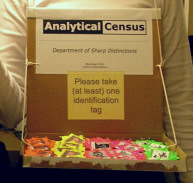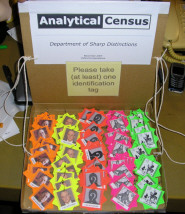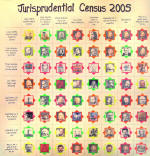| |
Jurisprudential
Orientation Test (JOT)
(2004)
Were you
always a Dworkinian at heart but thought
of yourself as a legal positivist? Have you just discovered the joys of
being Finnisian? Or do you go meta?
Whatever your
intuition about your jurisprudential
orientation, here is the definite jot test. Take it
and find out. (If you feel tempted to take this very seriously, read the
disclaimer.)
Update
27.11.05: the most recent Jurisprudential
Census
of the Oxford Jurisprudence community.

 Test Test
For each
statement/question, select the
comment/answer with which you agree most. Remember
its colour.
1. Someone
writing, with a philosophical
aim, about 'the law' and not about 'law'...
 ...is a
philosophically ambitious lawyer. ...is a
philosophically ambitious lawyer.
 ...cannot
reach a fruitful understanding of either 'the law' or 'law'. ...cannot
reach a fruitful understanding of either 'the law' or 'law'.
 What's
the
difference? What's
the
difference?
 ...does
legal doctrine, but not philosophy of law. ...does
legal doctrine, but not philosophy of law.
2. What is
'law as integrity'?
 An unholy
mixture of theory and meta-theory. An unholy
mixture of theory and meta-theory.
 Everything. Everything.
 Nothing.
Integrity is not practiced, enforced, endorsed, accepted or otherwise
engaged with by lawyers (that's why they're rich). Nothing.
Integrity is not practiced, enforced, endorsed, accepted or otherwise
engaged with by lawyers (that's why they're rich).
 A
confusion
of is and ought. A
confusion
of is and ought.
3. Hart
presented secondary rules as
'remedies' to 'defects'.
 Yes, a
regrettable expositional accident! Yes, a
regrettable expositional accident!
 It shows
that Hart was not doing value-free description. It shows
that Hart was not doing value-free description.
 It raises
a
doubt about Hart's claim that he was doing 'descriptive sociology'. It raises
a
doubt about Hart's claim that he was doing 'descriptive sociology'.
 Well,
Hart
knew that it's always a great thing to have (liberal) law! Well,
Hart
knew that it's always a great thing to have (liberal) law!
4. Being
interesting is...
 ...doing
political philosophy. ...doing
political philosophy.
 ...not a
criterion of validity. ...not a
criterion of validity.
 ...a
reasonable way to promote the basic good of knowledge. ...a
reasonable way to promote the basic good of knowledge.
 ...a
consideration by which to judge a theory. ...a
consideration by which to judge a theory.
5. The
moral considerations invoked in
judicial arguments - were they part of the law before they were invoked?
 This
question reveals the tension between the enterprises of justifying and
explaining law. This
question reveals the tension between the enterprises of justifying and
explaining law.
 No, or
only
if referred to in prior directives valid by their sources. No, or
only
if referred to in prior directives valid by their sources.
 Yes of
course - that's why they were, and had to be, invoked. Yes of
course - that's why they were, and had to be, invoked.
 It
doesn't
matter. It
doesn't
matter.
6. Can
lawyers disagree about law?
 Yes. Yes.
 Yes. Yes.
 Yes, and
I
am the only one who has realised it. Yes, and
I
am the only one who has realised it.
 Yes. Yes.
7. Can
structurally developed legal systems be more
or less legal?
 Y......es,
perhaps in a strong sense of 'legality' that includes moral norms
applying to the legal profession (distinct from criteria of validity)... Y......es,
perhaps in a strong sense of 'legality' that includes moral norms
applying to the legal profession (distinct from criteria of validity)...
 Yes, the
central case of law is that of morally good law. Yes, the
central case of law is that of morally good law.
 An
affirmative answer reveals an evaluation of what is
important about law. An
affirmative answer reveals an evaluation of what is
important about law.
 No,
though
if Hercules goes on holiday accidents may happen. No,
though
if Hercules goes on holiday accidents may happen.
( bis...
unless, of course, you think everything
is important about law). bis...
unless, of course, you think everything
is important about law).
8. The
widepread rough agreement in a community
about which standards are legal is called...
 (A type
of)
Pre-theoretical understanding. (A type
of)
Pre-theoretical understanding.
 Pre-interpretive agreement. Pre-interpretive agreement.
 Rule of
recognition or something analogous to it. Rule of
recognition or something analogous to it.
 Whichever
branding makes your theory look most different from your neighbour's
theory. Whichever
branding makes your theory look most different from your neighbour's
theory.
9. Law's
claim to give morally justified reasons
for action is...
 A
theoretical device used by those who have a particular view about the
purpose or point of law. A
theoretical device used by those who have a particular view about the
purpose or point of law.
 The
unsurprising consequence of the existence of Hercules and/or his
followers. The
unsurprising consequence of the existence of Hercules and/or his
followers.
 Mainly a
fact about legal language. Mainly a
fact about legal language.
 The
reflection at the level of law of law's purpose or point. The
reflection at the level of law of law's purpose or point.
10. What is
the relation between description and
prescription in Jurisprudence?
 None.
They
are relevant to different parts of Jurisprudence. None.
They
are relevant to different parts of Jurisprudence.
 They
can't
be distinguished. They
can't
be distinguished.
 They can
(and must) be distinguished, but are mutually dependent. They can
(and must) be distinguished, but are mutually dependent.
 You mean
what is, or what should be the
relation...? You mean
what is, or what should be the
relation...?

 Results Results
Are your
answers mostly of one colour? If so, here
is your jurisprudential orientation. (If not, see below.)
If your answers are mostly red,
you are a Positivist! Welcome to the renowned
tradition (allegedly) represented by lots of eminent theorists over
many years, whose names unfortunately slip our mind at the moment.
|
 |
If your answers are mostly blue,
you don't need us to tell you what you always knew. As a Dworkinian,
you may have found this test uninteresting, despite our attempts to
present it in its best light.
|
 |
If your answers are mostly yellow,
you are fortunate to be a Finnisian. Make sure that
Finnisianism doesn't take you too far away from the ideas of Finnis
himself, though.
|
 |
If your answers are mostly green,
you go meta! Surely you have
realised that many problems in Jurisprudence are
tied to problems of Jurisprudence -- of its
self-definition qua subject. We hope you will help Jurisprudence in its
ongoing quest for identity!
|
 |
If your
answers are not mostly of one colour, but of two or
more, don't panic! We have labels for you as well. (You may have
noticed that there is no shortage of labels.) As a matter of fact, we
have two labels for you to choose from.
Given that
your answers are not consistently of one
colour, you may either be Confused or (and note
that this 'or' is strongly disjunctive) Post-Modern,
depending on whether you are contradictory or you can live with
contradiction.

 On
the practical relevance of the results On
the practical relevance of the results
What to make
of these results? Do they have any
practical relevance?
Understanding
'practical' in the philosophical
sense-- 'practical' ('with a view of action') as opposed to
'speculative' - the 'practical' relevance of these results will be
determined by your conscience. For a professedly biased opinion about
what role knowledge of your true jurisprudential orientation should
play in your practical reasoning, jot down your
results to the website editor. (Please take all this with a jot of humour!)
Understanding
'practical' in the colloquial sense - the sense in which philosophy is sometimes not practical - the
'practical' relevance of these results is not yet clear. It may become
clear at some indefinite point in the future. There is a draft proposal
of a recommendation to the tutorial stipendiary governing body of the
supernumerary JOT committee for Michaelmas Term, which suggests
structuring the seating in the Jurisprudence
Discussion Group sessions according to jurisprudential
orientation. Rather than distinguishing between a left and a right
sector (as they did in the French National Assembly), it proposes a
core-periphery (central/marginal case) allignment to fit the round
shape of the Danson room: Finnisians surrounding the speaker's table in
the center, next the positivists (if any), on the outskirts the
Dworkinians; meta-people looking into the room from outside the window,
post-moderns discussing in the pub and the confused... perhaps giving
the presentation?
| At
any rate, you should be aware that there is an ongoing effort on the
part of the Jurisprudence community to develop a 'census' of its
members according to jurisprudential orientation. During last year's Jurisprudence
Party (17 November 2004), someone (who?) carrying this tray
with a series of identification tags went around asking attendees to
jurisprudentially identify themselves. | |

|
 |
'I am a Dworkinian' tags were the first to run out, with John Gardner
wearing one of them - he later confessed to having sent it to Dworkin.
(Partly as a result of these events, it was decided to monitor the
entry to the 2005 Jurisprudence Party.) Several 'I am evil, i.e.
postmodern' tags were left over. There was a tendency to wear the 'I am
a Finnisian' tag along with the 'I go meta' tag. (Strangely someone
added to it the 'I am evil, i.e. postmodern' tag!)
|
|
Update 27.11.05:
the most recent Jurisprudential
Census
of the Oxford Jurisprudence community is available (along with photos
of the 2005 Jurisprudence Party).
|
 |

 Disclaimer Disclaimer
The
Jurisprudential Orientation Test aims at
providing a somewhat humorous perspective on current debates in
(Oxford) Jurisprudence. The suggested ontological status and soundness
of the 'labels' (orientations), as well as their reduction to a
checklist of claims, is meant as a joke. A joke which - like every joke
that is not absurd - harbours some kind of message. The same applies to
the remarks about the 'practical relevance' of the jurisprudential
orientation (but the facts about the 2004 Jurisprudence Party are
real!). The attribution of the different statements to the various
theoretical positions is, for the most part, intended to be accurate.
Accurate, if on occasion grotesque. The reader is reminded that the
frontiers between the essential, the overstated and the grotesque are
often thin, especially in a subject where grasping 'the essential' of a
position often involves looking at it through the lens of another
position. Nothing on this page is intended, and thus ought not to be
construed, as a mockery of any theoretical position or of any of its
exponents.
--
|
|











